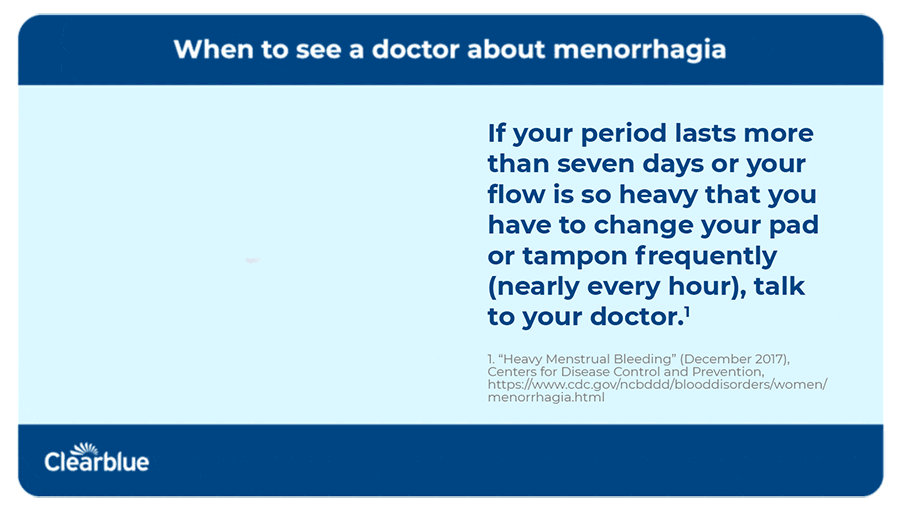Heavy periods: What is menorrhagia?

You may not be familiar with the word menorrhagia, but you might be familiar with what it means. Menorrhagia is menstrual bleeding that lasts more than seven days, or bleeding that is extremely heavy.1 So how do you know if you have it? When should you see a doctor? And how do you treat it? Let’s dive into the answers together.
What is menorrhagia, exactly?
Actually, your first question could be, “How do I pronounce menorrhagia?” It’s pronounced “meh-ner-AY-jee-uh,” and its complicated pronunciation might prevent you from associating the condition with the symptoms and signs. If you need to change your pad or tampon every hour, have large blood clots or have other strenuous period symptoms (like constant stomach pain or lack of energy), you may have menorrhagia1 — but we’ll discuss what to look for in a bit.
What causes menorrhagia, or heavy periods?
During your menstrual cycle, if an egg is not fertilized, the uterine lining breaks down and bleeds. Hormone problems or conditions that affect the uterus can cause heavy bleeding, though they aren’t the only possible causes.2 Potential causes fall into the following three areas, which your health care provider can help diagnose:
- Hormone-related problems: Imbalance of estrogen, progesterone or other hormones.2
- Uterine problems: Types of birth control (for example, an intrauterine device [IUD]), fibroids or benign tumors of the uterus, cancer of the uterus or cervix, or problems related to pregnancy such as a miscarriage or ectopic pregnancy1.
- Other illnesses: Bleeding-related disorders (such as von Willebrand disease or platelet function disorder) or nonbleeding-related disorders (such as liver, kidney or thyroid disease; pelvic inflammatory disease; and cancer).1
Even though you may be focused on the discomfort of heavy periods, your doctor will diagnose the cause and help you manage the symptoms. So, when should you see a medical professional?

What symptoms might point to menorrhagia?
Every body is different, so it might be hard to determine if your period flow is actually heavy. Usually, menstrual bleeding lasts about three to seven days and the average amount of menstrual flow is 5 to 12 teaspoons (that’s 30 to 72 milliliters) of blood during your period. If your period lasts more than seven days, or your flow is so heavy that you have to change your pad or tampon frequently (nearly every hour), talk to your doctor.
If you aren’t sure how long your menstrual cycle lasts, it’s a good idea to start tracking your period. This will help you get to know your body and your cycle better and will allow you to have a more informed conversation if you do see a doctor.
Also keep in mind that your period can change with age. According to the American College of Obstetricians and Gynecologists (ACOG), changes in your menstrual cycle during perimenopause are normal. Your periods may become shorter or longer, or your menstrual flow may become heavier or lighter.3 Don’t discount a visit to the doctor about possible menorrhagia if you didn’t experience it earlier in life.
Is menorrhagia normal?
Menorrhagia is more common than you think; it affects more than 10 million American women each year.1 About one in every five women experience it, so you aren’t alone in your search for answers and treatment. Some women may not seek help because they assume it’s not available or they’re too shy to bring it up with their doctor. Remember: no question related to your health and well-being is off-limits to your healthcare provider. If you think you need a second opinion, don’t hesitate to seek one.
How to treat menorrhagia
Your treatment will depend on a few things: the cause of your bleeding, medical factors (age, history, response to medicines or procedures) and your desired outcome.1 Do you not want to have a period at all? Or do you just want it to be less heavy? Do you want to have children in the future, or are you done having kids? You should discuss the answers to these questions with your doctor, as well as what treatment options are available. Here are some of the most common options:
- Iron supplements, if you show signs of anemia
- Ibuprofen to help reduce pain, cramps and the amount of bleeding
- Birth control pills to make periods and flow more predictable
- Intrauterine contraception (IUC) to make periods more regular and reduce the amount of bleeding
- Hormone therapy to help reduce the amount of bleeding
- Desmopressin nasal spray to stop bleeding and help blood clotting in people with certain bleeding disorders
- Antifibrinolytic medicines (tranexamic acid, aminocaproic acid) to reduce bleeding
- Surgical treatment (dilation and curettage, operative hysterectomy, endometrial ablation or resection or a hysterectomy)1
Some of these treatments are ongoing, low-maintenance solutions for pain or discomfort, while others are intensive changes for long-term relief. Your doctor can help you decide what will fit best with your symptoms, body and lifestyle. Although searching for an answer might be intimidating, know that your health, security and safety are worth prioritizing.
Source
- "Heavy Menstrual Bleeding,” (December 2017), Centers for Disease Control and Prevention, https://www.cdc.gov/ncbddd/blooddisorders/women/menorrhagia.html
- “Menorrhagia,” (n.d.), Johns Hopkins Medicine, https://www.hopkinsmedicine.org/health/conditions-and-diseases/menorrhagia
- “Perimenopausal Bleeding and Bleeding After Menopause,” (October 2020), The American College of Obstetricians and Gynecologists, https://www.acog.org/womens-health/faqs/perimenopausal-bleeding-and-bleeding-after-menopause




